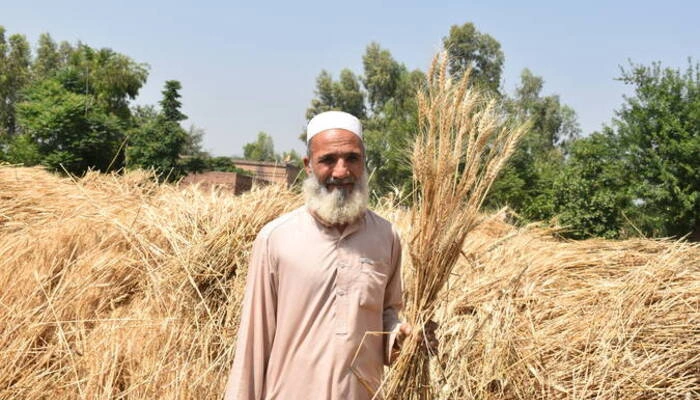
Scientists at the Agricultural Research Institute Tarnab (ARIT) in Peshawar have introduced three new climate-resilient wheat varieties, providing a vital solution for farmers battling the effects of climate change. These innovative seeds promise a threefold increase in per-acre yield and enhanced resilience to extreme weather conditions, revolutionizing wheat production in Khyber Pakhtunkhwa (KP).
Addressing KP’s Wheat Crisis
KP currently faces a massive wheat production deficit. The province produces only 1.4 million tonnes annually, while its consumption needs stand at 5 million tonnes. With 51% of farming land dependent on rain, unpredictable weather patterns have further worsened the challenges for wheat farmers.
A recent ARIT report highlighted that wheat production and the area under cultivation in KP have remained stagnant for nearly a decade. From 2015 to 2023, the total area under wheat cultivation increased only slightly, from 0.753 million hectares to 0.770 million hectares. Similarly, production has hovered between 1.247 and 1.47 million tonnes, with minimal progress.
Read: New Mpox Cases Detected in KPK, Raising Nationwide Count to 3
Climate Change’s Impact on Agriculture
Akhtar Ali, a senior agricultural scientist at ARIT, explained how climate change has severely affected farming in KP over the past five years. Delayed rains, altered weather patterns, and longer gaps between seasons have disrupted traditional farming cycles.
Ali noted that existing wheat varieties have become less productive due to these climate shifts. To combat this, ARIT has spent years developing seeds better suited to current conditions. “We’ve introduced two seed types—one for rain-fed lands and another for canal-irrigated areas. The canal-irrigated variety can produce three times more yield per acre than the existing seeds,” he said.
The Need for Modern Farming Techniques
Despite the promising potential of these new seeds, scientists emphasized that traditional farming practices must evolve. Altaf Khan, another ARIT researcher, explained that outdated techniques hinder agricultural progress. “Farmers must adopt scientific methods to unlock the full potential of these seeds,” he urged.
He added that achieving significant production increases remains challenging, particularly given the rising costs of fertilisers, pesticides, and seeds.
Farmer Challenges and Concerns
Farmers across KP have voiced their concerns about wheat farming’s declining profitability. Marwan Khan, a farmer from Charsadda district, shared how market instability forced him to reduce his wheat cultivation area by 20% last year. He noted that in 2023, a 50 kg wheat sack sold for over Rs6,000, but production costs had skyrocketed, leaving little profit.
Similarly, Ashfaq Ahmed explained that modern farming requires far more fertilisers and pesticides than in the past, further increasing expenses. “The prices of fertilisers, seeds, and pesticides have quadrupled, adding to our burden,” he said.
Innovation Requires Support
While the development of climate-resilient seeds marks a significant step forward, researchers emphasize the need for government support. Providing affordable seeds, fertilisers, and pesticides is crucial for farmers to adopt these innovations. Additionally, raising awareness about climate change’s impact on agriculture will help farmers adapt to the evolving challenges.
This breakthrough in wheat production not only addresses KP’s immediate agricultural needs but also highlights the critical role of innovation and government support in ensuring food security for the future.
Follow Day News on Google News, Instagram, YouTube, Facebook, Whats App, and TikTok for latest updates











